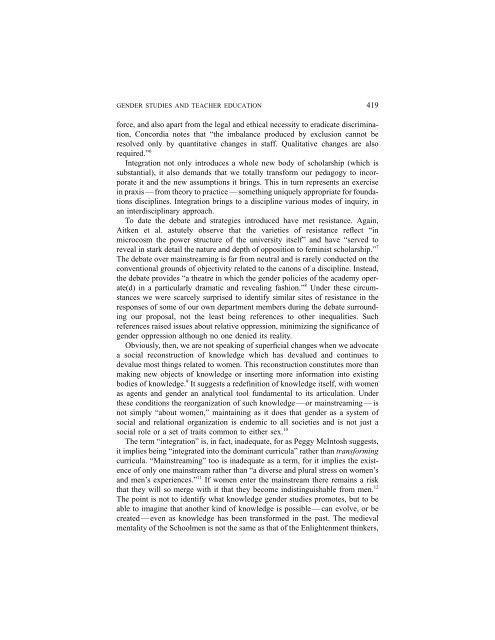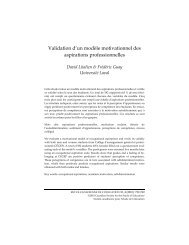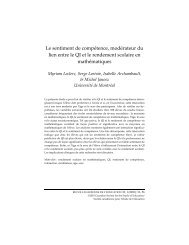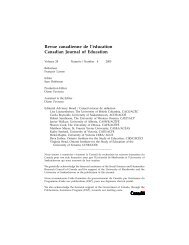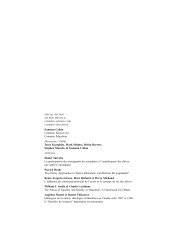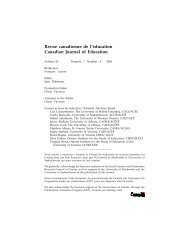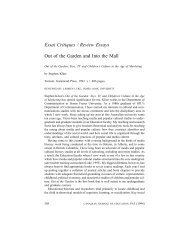Mireille Falardeau et Michel Loranger Le choix de stratégies ... - CSSE
Mireille Falardeau et Michel Loranger Le choix de stratégies ... - CSSE
Mireille Falardeau et Michel Loranger Le choix de stratégies ... - CSSE
Create successful ePaper yourself
Turn your PDF publications into a flip-book with our unique Google optimized e-Paper software.
GENDER STUDIES AND TEACHER EDUCATION 419<br />
force, and also apart from the legal and <strong>et</strong>hical necessity to eradicate discrimination,<br />
Concordia notes that “the imbalance produced by exclusion cannot be<br />
resolved only by quantitative changes in staff. Qualitative changes are also<br />
required.” 6<br />
Integration not only introduces a whole new body of scholarship (which is<br />
substantial), it also <strong>de</strong>mands that we totally transform our pedagogy to incorporate<br />
it and the new assumptions it brings. This in turn represents an exercise<br />
in praxis — from theory to practice — som<strong>et</strong>hing uniquely appropriate for foundations<br />
disciplines. Integration brings to a discipline various mo<strong>de</strong>s of inquiry, in<br />
an interdisciplinary approach.<br />
To date the <strong>de</strong>bate and strategies introduced have m<strong>et</strong> resistance. Again,<br />
Aitken <strong>et</strong> al. astutely observe that the vari<strong>et</strong>ies of resistance reflect “in<br />
microcosm the power structure of the university itself” and have “served to<br />
reveal in stark d<strong>et</strong>ail the nature and <strong>de</strong>pth of opposition to feminist scholarship.” 7<br />
The <strong>de</strong>bate over mainstreaming is far from neutral and is rarely conducted on the<br />
conventional grounds of objectivity related to the canons of a discipline. Instead,<br />
the <strong>de</strong>bate provi<strong>de</strong>s “a theatre in which the gen<strong>de</strong>r policies of the aca<strong>de</strong>my operate(d)<br />
in a particularly dramatic and revealing fashion.” 8 Un<strong>de</strong>r these circumstances<br />
we were scarcely surprised to i<strong>de</strong>ntify similar sites of resistance in the<br />
responses of some of our own <strong>de</strong>partment members during the <strong>de</strong>bate surrounding<br />
our proposal, not the least being references to other inequalities. Such<br />
references raised issues about relative oppression, minimizing the significance of<br />
gen<strong>de</strong>r oppression although no one <strong>de</strong>nied its reality.<br />
Obviously, then, we are not speaking of superficial changes when we advocate<br />
a social reconstruction of knowledge which has <strong>de</strong>valued and continues to<br />
<strong>de</strong>value most things related to women. This reconstruction constitutes more than<br />
making new objects of knowledge or inserting more information into existing<br />
bodies of knowledge. 9 It suggests a re<strong>de</strong>finition of knowledge itself, with women<br />
as agents and gen<strong>de</strong>r an analytical tool fundamental to its articulation. Un<strong>de</strong>r<br />
these conditions the reorganization of such knowledge — or mainstreaming — is<br />
not simply “about women,” maintaining as it does that gen<strong>de</strong>r as a system of<br />
social and relational organization is en<strong>de</strong>mic to all soci<strong>et</strong>ies and is not just a<br />
social role or a s<strong>et</strong> of traits common to either sex. 10<br />
The term “integration” is, in fact, ina<strong>de</strong>quate, for as Peggy McIntosh suggests,<br />
it implies being “integrated into the dominant curricula” rather than transforming<br />
curricula. “Mainstreaming” too is ina<strong>de</strong>quate as a term, for it implies the existence<br />
of only one mainstream rather than “a diverse and plural stress on women’s<br />
and men’s experiences.” 11 If women enter the mainstream there remains a risk<br />
that they will so merge with it that they become indistinguishable from men. 12<br />
The point is not to i<strong>de</strong>ntify what knowledge gen<strong>de</strong>r studies promotes, but to be<br />
able to imagine that another kind of knowledge is possible — can evolve, or be<br />
created — even as knowledge has been transformed in the past. The medieval<br />
mentality of the Schoolmen is not the same as that of the Enlightenment thinkers,


